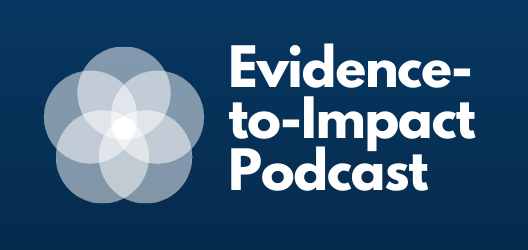
Episode Overview
In this month’s episode, we spoke to Alexis Santos, PhD, Assistant Professor of Human Development and Family Studies at Penn State, and David Saunders, Director of the Office of Health Equity for the Pennsylvania Department of Health, about different disparities throughout the Pennsylvania Commonwealth and how the lack of good data impacts what we understand about poverty and health inequities. The discussion stems from a project between Penn State’s Administrative Data Accelerator and Office of Health Equity which examined associations between socioeconomic characteristics of the counties of Pennsylvania and life expectancy. Interestingly, those associations can potentially help to address disparities across the state through policy mechanisms.
According to the U.S. Office of Disease Prevention and Health Promotion’s website, the phrase “social determinants of health” are conditions in the environments in which people are born, live, learn, work, play, worship, and age that affect a wide range of health, functioning, and quality-of-life outcomes and risks. Conditions (e.g., social, economic, and physical) in these various environments and settings (e.g., school, church, workplace, and neighborhood) have been referred to as “place.”
Note: This episode was recorded prior to the outbreak of COVID-19 and does not address current circumstances, but the issues discussed are undoubtedly exacerbated due to the conditions of the pandemic. For clarification, Penn State’s Administrative Data Accelerator is an infrastructure of the Evidence-to-Impact Collaborative at Penn State, which specializes in the acquisition, linkage and responsive use of often sensitive administrative data for research purposes—coming from both government, industry or other sources
Key Information
SourceEvidence-to-Impact Collaborative
Publication DateOctober 12, 2020
Resource TypeAudio
Recent Podcast Episodes
Share This Page
Episode Overview
In this month’s episode, we spoke to Alexis Santos, PhD, Assistant Professor of Human Development and Family Studies at Penn State, and David Saunders, Director of the Office of Health Equity for the Pennsylvania Department of Health, about different disparities throughout the Pennsylvania Commonwealth and how the lack of good data impacts what we understand about poverty and health inequities. The discussion stems from a project between Penn State’s Administrative Data Accelerator and Office of Health Equity which examined associations between socioeconomic characteristics of the counties of Pennsylvania and life expectancy. Interestingly, those associations can potentially help to address disparities across the state through policy mechanisms.
According to the U.S. Office of Disease Prevention and Health Promotion’s website, the phrase “social determinants of health” are conditions in the environments in which people are born, live, learn, work, play, worship, and age that affect a wide range of health, functioning, and quality-of-life outcomes and risks. Conditions (e.g., social, economic, and physical) in these various environments and settings (e.g., school, church, workplace, and neighborhood) have been referred to as “place.”
Note: This episode was recorded prior to the outbreak of COVID-19 and does not address current circumstances, but the issues discussed are undoubtedly exacerbated due to the conditions of the pandemic. For clarification, Penn State’s Administrative Data Accelerator is an infrastructure of the Evidence-to-Impact Collaborative at Penn State, which specializes in the acquisition, linkage and responsive use of often sensitive administrative data for research purposes—coming from both government, industry or other sources
Key Information
SourceEvidence-to-Impact Collaborative
Publication DateOctober 12, 2020
Resource TypeAudio
Recent Podcast Episodes
Share This Page
LET’S STAY IN TOUCH
Join the Evidence-to-Impact Mailing List
Keep up to date with the latest resources, events, and news from the EIC.













